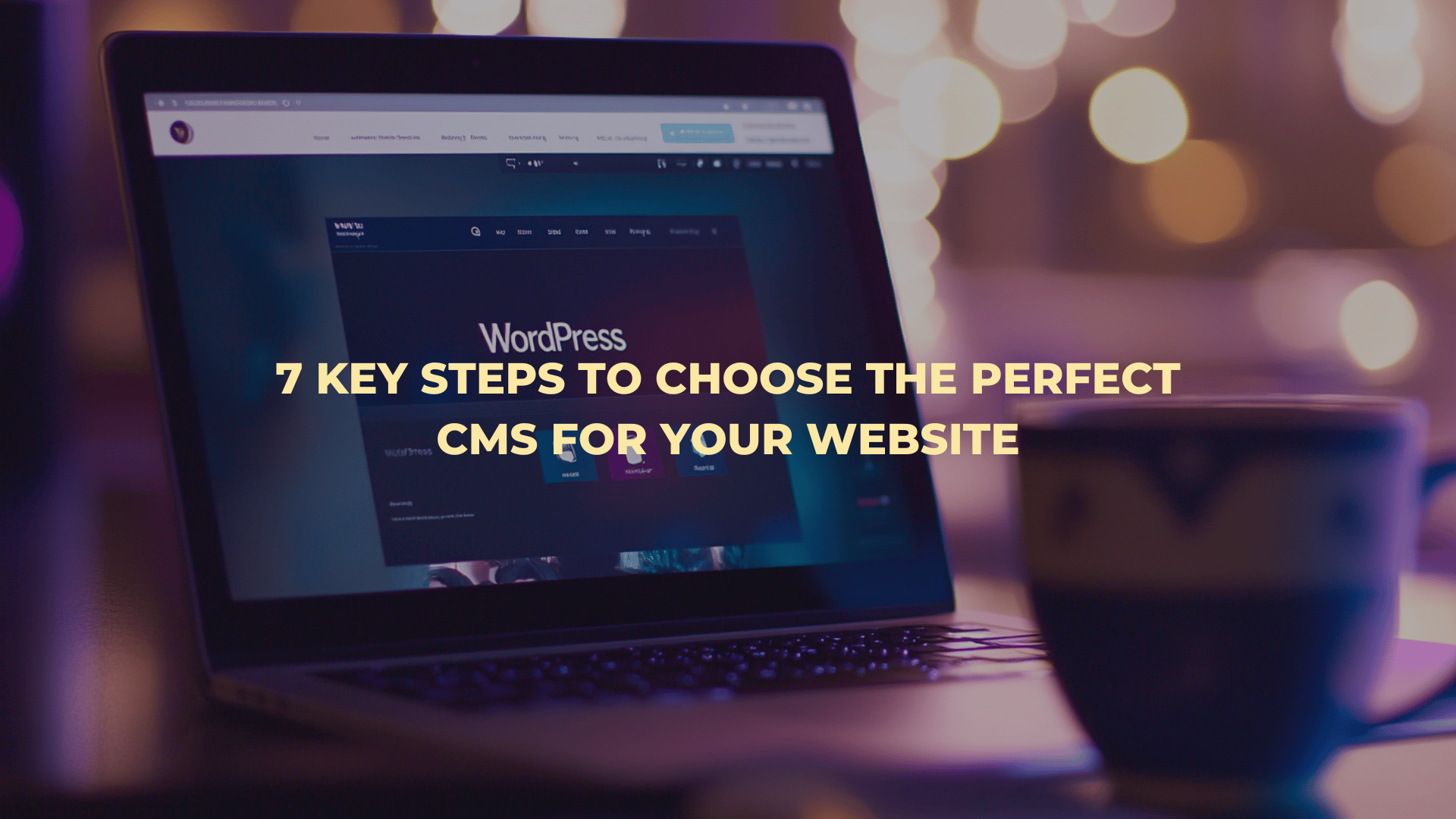7 Key Steps to Choose the Perfect CMS for Your Website
October 23, 2024
Selecting the right Content Management System (CMS) is a crucial decision for any website, as it forms the backbone of your digital presence and directly impacts your ability to deliver seamless customer experiences. Here are seven key steps to help you choose the perfect CMS for your website.

Table of Contents
1. Define Your Business Requirements
Before diving into the vast array of CMS options, it’s essential to understand your business’s unique needs. This involves going beyond a superficial understanding of what a CMS can offer and determining precisely what your company requires. Consider whether you need robust commerce features, integration with a specific CRM, or if personalization and automation are core to your business strategy.
For instance, if your business relies heavily on e-commerce, you might need a CMS with native digital marketing capabilities and customer experience management features. On the other hand, if you’re looking for simplicity and ease of use, a more straightforward CMS like WordPress might be the way to go.
2. Evaluate SEO Friendliness
Search Engine Optimization (SEO) is a critical factor in choosing a CMS. A CMS that handles new URL creation, unique titles, and meta descriptions efficiently can significantly benefit your content strategy. Additionally, with the rise of voice technology, ensure your CMS supports SEO in more conversational channels. Explore how to optimize your website for voice search in 2024 to better understand these new trends.
When evaluating SEO capabilities, look at the platform’s track record of success with technical SEO support and the availability of both native and third-party SEO tools. This will help you avoid platforms that are below average in SEO capabilities.
3. Assess Integration with Backend Systems
Your CMS should act as the hub of your marketing technology stack, seamlessly connecting with other backend systems such as CRM, marketing automation solutions, and commerce platforms. Look for CMS platforms that offer open-source or API-powered options to share information across these systems. This integration is crucial for delivering powerful omnichannel experiences and maintaining efficiency and experience continuity.
For example, if you’re using a CRM like Salesforce, ensure your CMS can integrate smoothly with it to enhance customer data management and personalization.
4. Consider Team Skills and Capabilities
The CMS you choose should align with the skills and expertise of your team. If your in-house team is well-versed in Magento or Drupal, it would be counterproductive to choose a CMS that uses different technologies. Aligning the CMS with your team’s capabilities ensures higher implementation quality and better utilization of your resources.
If you don’t have the necessary talent in-house, consider hiring experienced personnel or partnering with a digital marketing agency that specializes in CMS implementations and AI-driven optimization services. Our team at [Your Agency Name] can help you navigate this process seamlessly.
5. Evaluate Hosting Options and Scalability
The hosting and licensing model of your CMS can significantly impact your total cost of ownership. Look for CMS suppliers that offer flexible hosting options, including managed services and cloud hosting, which can alleviate the burden on your IT staff. Additionally, ensure the CMS can scale with your business growth, accommodating increased traffic and new features without compromising performance.
Scalability is crucial as your business evolves. A CMS that can handle the growing needs and demands of your company will save you from the hassle and cost of another CMS migration down the line.
6. Assess Customer Service and Community Support
After implementing a CMS, long-term maintenance is crucial. The quality of customer service provided by the CMS company can make or break your experience. Look for CMS providers that offer round-the-clock customer support, robust community forums, and regular updates and glitch fixes. An active community associated with the CMS can also be a significant asset.
Good customer service ensures that any issues are resolved promptly, and you receive the necessary support to keep your website running smoothly.
7. Ensure Security and Compliance
Security is a top priority when choosing a CMS. Ensure the CMS you select has robust security features to protect your website from hacking, phishing, and spam. Look for built-in security features and additional plugins that can enhance your website’s security. Even with the right CMS, having experienced personnel who can guide recovery efforts in case of a security breach is essential.
In today’s digital landscape, security breaches can have severe consequences. Choosing a CMS with strong security features and maintaining a vigilant approach to security can safeguard your business and user data.
Additional Considerations
Avoid Shiny Object Syndrome
While features like headless CMS capabilities, personalization, and omnichannel experiences are appealing, it’s important to be realistic about your company’s maturity and resources. Ensure you have the necessary resources and processes to keep up with the content creation and curation needs of these advanced features. Getting distracted by “shiny objects” can be more harmful than helpful if they don’t align with your current capabilities and goals.
Take Product Demos Seriously
Once you’ve narrowed down your options, take product demos seriously. This phase is crucial in evaluating the product against your documented needs. Ensure the product satisfies both your objective and subjective criteria. A successful demo will help you avoid being swayed by charismatic salespeople or getting stuck in an endless sales cycle.
Select an Implementation Partner Early
Bringing an implementation partner onboard early in the process can be highly beneficial. They should have a full understanding of your company goals and be able to translate these into technical requirements and implementation strategies. The right partner will have a multidisciplinary team consisting of analysts, architects, and developers who can help distill your needs into actionable steps.
At [Your Agency Name], our team of experts is well-equipped to guide you through the CMS selection and implementation process, ensuring that your website is optimized for maximum performance and user experience.
Conclusion
Choosing the right CMS is a critical decision that can significantly impact your website’s performance, user experience, and overall business success. By carefully evaluating your business requirements, SEO needs, integration capabilities, team skills, hosting options, customer service, and security features, you can make an informed decision.
If you’re still unsure about which CMS is the best fit for your business or need help with the implementation process, consider reaching out to a digital marketing agency specializing in AI-driven optimization services. Our team at [Your Agency Name] is here to help you create exceptional customer experiences and drive business growth. Discover how to generate marketing content with AI effectively to complement your CMS choice.
Take the Next Step
- Discover How Our AI Optimization Services Can Transform Your Website
- Get a Free Consultation to Choose the Right CMS for Your Business
- Read More About Our Success Stories and Client Testimonials
By aligning your CMS with your business needs and leveraging AI-driven optimization, you can create a powerful digital presence that drives engagement, conversions, and long-term success.
FAQ
What is a CMS and why do I need one?
A Content Management System (CMS) is a software platform that allows you to create, manage, and modify website content without specialized technical knowledge. You need one to efficiently manage your website’s content, ensure consistent updates, and maintain a strong digital presence.
How do I know which CMS is right for my business?
Start by defining your business requirements, evaluating your team’s technical capabilities, and considering factors like SEO needs, integration requirements, and scalability. The right CMS should align with your specific business goals and resources.
What are the most important security features to look for in a CMS?
Look for built-in security features like regular security updates, user authentication, role-based access control, secure file upload handling, and SSL support. The CMS should also have a strong track record of addressing security vulnerabilities quickly.

